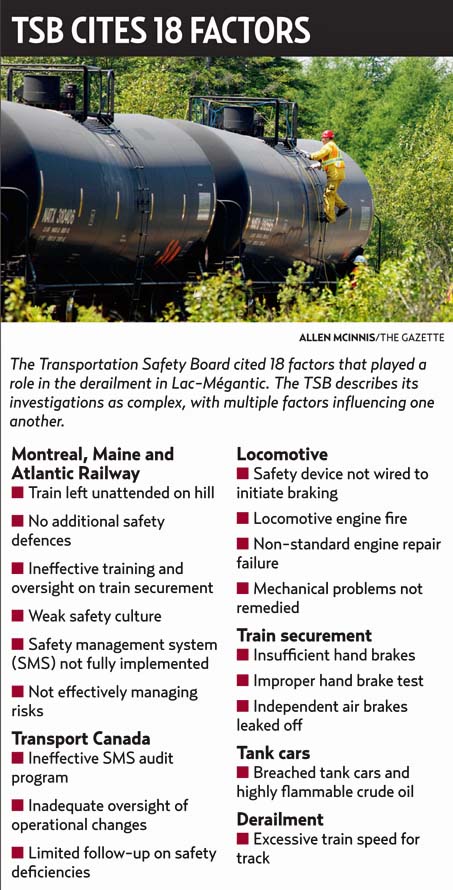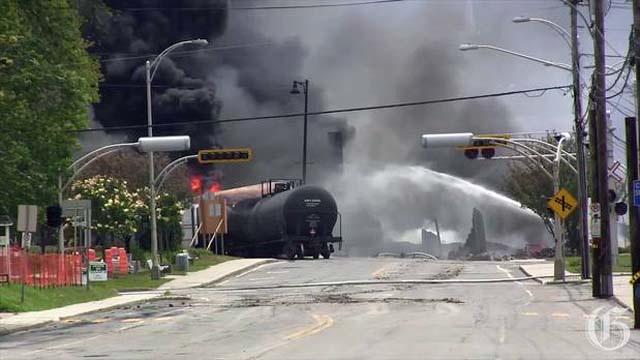Firefighters direct cooling water onto tank cars to prevent an explosion - Date unknown Anonymous Photographer. 20 August 2014 Transportation Safety Board Slams Transport Canada in Lake Megantic Disaster Gatineau Quebec - Transport Canada (TC) was slammed Tuesday in a long-awaited report into last summer's train disaster that claimed the lives of 47 people, for not forcing Montreal Maine & Atlantic Railway (MMA) to improve its safety record.
"Each time TC inspectors were saying, OK, we found this, you've got to do this, but nobody was looking at it from a big-picture point of view to say, Have we got a systemic problem? Have we got a pattern here?" Wendy Tadros, president of the Transportation Safety Board (TSB), said in an interview.
Time and again, MMA, owners of the errant train involved in the Lake Megantic disaster, were found to have lax safety standards, yet no government inspectors stayed on top of the problem until it was fixed.
At a golf course outside of this Eastern Townships village, the TSB released its report, which concluded that 18 factors contributed to the tragedy that incinerated the picturesque downtown core on 6 Jul 2013 and forced many to flee for their lives in the middle of the night.

Despite its unimaginable sorrow, the town of 6,000 soldiers on, with part of its downtown still fenced off as workers continue to remove the millions of litres of crude oil that soaked the area.
Illnesses, including depression, have increased and many have left town for good.
While the report identifies problems with the locomotive and tank cars, much of the blame falls on the shoulders of MMA for its "weak safety culture" and TC for failing to ensure safety breaches were fixed.
The TSB also added two recommendations to the three that it made earlier this year.
It wants TC to ensure "additional physical defences are in place so trains will always be secure."
"Because right now, TC is relying on the rules and they still allow a train carrying dangerous goods to be left unattended on a descending grade," Tadros said.
It also wants TC to stay on top of railways to make sure they are implementing the safety systems they are all to have on paper.
TC has to audit safety systems "in sufficient depth and with sufficient frequency" to ensure they are effective and that action is taken when problems are found, Tadros said.
In Ottawa, Transport Minister Lisa Raitt responded in a statement, saying her department accepts and is implementing the recommendations made by the TSB.
The board is an independent agency created by Parliament whose mandate includes identifying deficiencies in all modes of transportation, but the Canadian Centre for Policy Alternatives this week called for an independent public inquiry into the disaster.
That sentiment was echoed by the union representing 45,000 transportation workers in Canada, which said the TSB recommendations are weak and will not adequately protect the public from future accidents.
"People die when governments shirk their responsibility to monitor the movement of dangerous cargo. This is not an area where we can afford to cut corners," Jerry Dias, Unifor's national president, said in a statement.
"The bottom line is that our rail safety system needs better enforcement of the rules, and that means more trained professionals on the job."
Tadros said that all 18 factors cited in the report, from the train being parked unattended on a downward slope, to lack of training for railway employees, contributed to the tragedy, but "if you take any one of those factors out of the equation, there may not have been an accident."
The train that barrelled into town that night originated in North Dakota and was headed for an Irving refinery in Saint John, New Brunswick.
The five locomotives were pulling 74 cars, 72 of which were carrying 7.7 million litres of crude oil.
The train had been parked for the night about 10 kilometres outside of Lake Megantic, at Nantes, with the lead locomotive running and seven hand brakes set.
A fire began in the lead locomotive, and when firemen turned off the engine, the air brakes stopped working.
The train began rolling downhill, picking up speed, before derailing and exploding in Lake Megantic.
Three men, including train engineer Thomas Harding, were arrested in May and face 47 charges of criminal negligence causing death.
But Tadros refused to comment on whether others failed to do their jobs.
"I can only do my job, and my job is safety and identifying the risks in the system and what needs to change so this doesn't happen again," she said in an interview.
"We looked very carefully at what the locomotive engineer did that night and were very clear about the problems with the way the train was secured. This is the question for the judicial system," she said about more people being held responsible.
"Our role, our mission, is to try to prevent another accident from happening, and in order to do that we have to drill down deeply and look at all the systemic issues."
Greenpeace Canada responded to the report, saying TC's "lax approach to safety" has meant the continuing unsafe transport of oil by rail.
"This report is a searing indictment of TC's failure to protect the public from a company that they knew was cutting corners on safety, despite the fact that it was carrying increasing amounts of hazardous cargo," Keith Stewart, the organization's Climate and Energy Campaign coordinator, said in a statement.
The TSB already recommended in January that the federal government require railways transporting flammable liquids to improve their cars to meet stricter standards that were introduced in 2011.
None of the Lake Megantic cars met those standards.
The TSB also recommended that railways do regular risk assessments and write emergency response assistance plans for all trains carrying large amounts of oil.
MMA was sold in January to New York-based hedge fund Railway Acquisition Holdings, for $14.25 million, less than what it owes its secured creditors.
The railway went into bankruptcy protection a month after the disaster.
Tadros said she finds it sometimes frustrating that it takes a major tragedy to break a safety logjam, but is convinced important changes are now happening as a result of Lake Megantic.
"I've seen faster and stronger action than I've ever seen before, and for me that's gratifying," she said.
"It's not so gratifying that it took such a horrible accident."
The Transportation Safety Board cited 18 causes and contributing factors to the Lake Megantic derailment on 6 Jul 2013:
- 1. MMA-002 was parked unattended on the main line, on a descending grade, with the securement of the train reliant on a locomotive that was not in proper operating condition;
- 2. The 7 hand brakes that were applied to secure the train were insufficient to hold the train without the additional braking force provided by the locomotive's independent brakes;
- 3. No proper hand brake effectiveness test was conducted to confirm that there was sufficient retarding force to prevent movement, and no additional physical safety defences were in place to prevent the uncontrolled movement of the train;
- 4. Despite significant indications of mechanical problems with the lead locomotive, the locomotive engineer, and the Bangor, Maine, rail traffic controller agreed that no immediate remedial action was necessary, and the locomotive was left running to maintain air pressure on the train;
- 5. The failure of the non-standard repair to the lead locomotive's engine allowed oil to accumulate in the turbocharger and exhaust manifold, resulting in a fire;
- 6. When the locomotive was shut down as a response to the engine fire, no other locomotive was started, and consequently, no air pressure was provided to the independent brakes. Further, locomotives with an auto-start system were shut down and not available to provide air pressure when the air brake system began to leak;
- 7. The reset safety control on the lead locomotive was not wired to initiate a penalty brake application when the rear electrical panel breakers were opened;
- 8. Because air leaked from the train at about 1 pound per square inch per minute, the rate was too slow to activate an automatic brake application;
- 9. When the retarding brake force provided by the independent brakes was reduced to about 97,400 pounds, bringing the overall retarding brake force for the train to approximately 146,000 pounds, the train started to roll;
- 10. The high speed of the train as it negotiated the curve near the Megantic West turnout caused the train to derail;
- 11. About one third of the derailed tank car shells had large breaches, which rapidly released vast quantities of highly volatile petroleum crude oil, which ignited, creating large fireballs and a pool fire;
- 12. MMA did not provide effective training or oversight to ensure that crews understood and complied with rules governing train securement;
- 13. When making significant operational changes on its network, MMA did not thoroughly identify and manage the risks to ensure safe operations;
- 14. MMA's safety management system was missing key processes, and others were not being effectively used. As a result, MMA did not have a fully functioning safety management system to effectively manage risk;
- 15. MMA's weak safety culture contributed to the continuation of unsafe conditions and unsafe practices, and compromised MMA's ability to effectively manage safety;
- 16. Despite being aware of significant operational changes at MMA, TC did not provide adequate regulatory oversight to ensure the associated risks were addressed;
- 17. TC Quebec Region did not follow up to ensure that recurring safety deficiencies at MMA were effectively analyzed and corrected, and consequently, unsafe practices persisted;
- 18. The limited number and scope of safety management system audits that were conducted by TC Quebec Region, and the absence of a follow-up procedure to ensure MMA's corrective action plans had been implemented, contributed to the systemic weaknesses in MMA's safety management system remaining unaddressed.
Sue Montgomery. |



